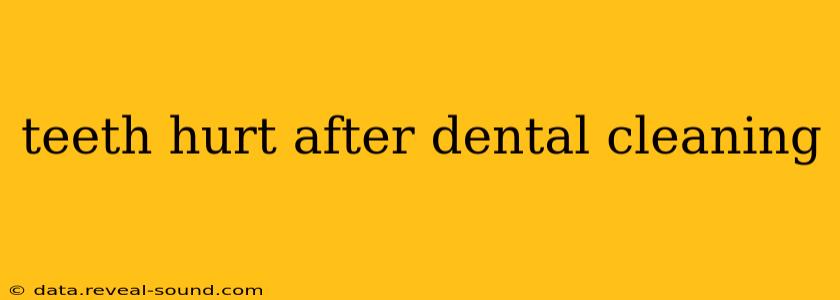It's frustrating when a dental cleaning, meant to improve your oral health, leaves you with tooth pain. While usually temporary, post-cleaning discomfort is a common experience. Understanding its causes and how to manage it is crucial for maintaining good oral hygiene and preventing future issues. This comprehensive guide will explore the reasons why your teeth might hurt after a cleaning and provide solutions to alleviate the discomfort.
Why Do My Teeth Hurt After a Dental Cleaning?
Several factors contribute to tooth sensitivity and pain after a dental cleaning. The most common culprits include:
-
Exposed Dentin: The cleaning process, especially if you have gum recession or tartar buildup, can expose the dentin, the layer beneath the enamel. Dentin contains microscopic tubules that lead directly to the nerves in your teeth, making them sensitive to temperature changes, pressure, and even air.
-
Gum Irritation: Aggressive cleaning or instruments can irritate your gums, leading to inflammation and sensitivity. This is particularly true if you have gum disease (gingivitis or periodontitis).
-
Sensitivity to Cleaning Products: Some individuals may be sensitive to the fluoride or other ingredients in the polishing paste used during the cleaning.
-
Residual Effects of Tartar Removal: Removing tartar, especially stubborn deposits, can temporarily cause discomfort due to the pressure applied during the procedure.
-
Underlying Dental Issues: In rare cases, post-cleaning pain might indicate an existing dental problem like a cracked tooth, a cavity, or an abscessed tooth that the cleaning has inadvertently exposed.
How Long Does Tooth Sensitivity After Cleaning Last?
The duration of post-cleaning tooth sensitivity varies from person to person. For most individuals, the discomfort subsides within a few days to a week. If the pain persists for longer than a week, or if it becomes severe, it's crucial to consult your dentist.
What Can I Do to Relieve the Pain?
Several home remedies can help manage post-cleaning tooth sensitivity:
-
Over-the-Counter Pain Relief: Non-steroidal anti-inflammatory drugs (NSAIDs) like ibuprofen can reduce inflammation and pain. Always follow the recommended dosage.
-
Desensitizing Toothpaste: These toothpastes contain ingredients like potassium nitrate or strontium chloride that help block the tubules in the dentin, reducing sensitivity. Use these toothpastes regularly, even after the initial pain subsides, to prevent future sensitivity.
-
Saltwater Rinse: Rinsing your mouth with warm saltwater several times a day can help soothe irritated gums and reduce inflammation.
-
Cold Compresses: Applying a cold compress to the affected area can help numb the pain and reduce swelling.
-
Avoid Irritants: Temporarily avoid hot, cold, acidic, and sugary foods and drinks that can exacerbate sensitivity.
Is Tooth Sensitivity After a Cleaning Normal?
Yes, some degree of tooth sensitivity after a dental cleaning is considered normal. However, the intensity and duration of the pain should be considered. Mild discomfort lasting a few days is usually nothing to worry about. However, severe or persistent pain warrants a visit to your dentist.
When Should I Call My Dentist?
You should contact your dentist if:
- The pain is severe and doesn't improve with home remedies.
- The pain lasts longer than a week.
- You experience swelling or bleeding gums.
- You notice any signs of infection, such as pus or increased sensitivity to touch.
Can I Prevent Tooth Sensitivity After Cleaning?
While some sensitivity is unavoidable, you can take steps to minimize the risk:
-
Maintain good oral hygiene: Regular brushing and flossing prevent tartar buildup, reducing the need for aggressive cleaning.
-
Inform your dentist about existing sensitivities: Let your dentist know if you have a history of sensitive teeth or gum problems. They can adjust their cleaning technique accordingly.
-
Use a fluoride mouthwash: Fluoride strengthens tooth enamel, making it more resistant to sensitivity.
By understanding the causes and managing the discomfort, you can ensure your next dental cleaning is a positive experience promoting your long-term oral health. Remember, open communication with your dentist is key to addressing any concerns and maintaining a healthy, pain-free smile.
